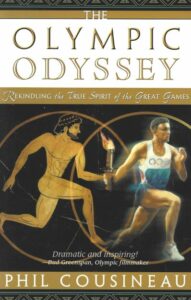The Olympic Odyssey – Rekindling the True Spirit of the Great Games
By Phil Cousineau.
257 Pages | First Quest Edition 2003 | Soft cover | Quest Books, U.S.A. | ISBN: 0835608336.
This book was purchased by the US Olympic Committee and given to each member of the US Olympic Team of the Summer 2004 Games as well as those participating in the Special Olympics.
In anticipation of the nostalgic return of the Games to Greece in 2004, mythologist and life-long athlete Phil Cousineau has produced a work that, unlike other titles on the subject, delves deeply into the spiritual dimension of the Olympics and potentially all athletic activity. They Olympic Odyssey takes the reader on a mythic journey from the ancient to the modern Games, telling tales of Gods, athletes and coaches in all their splendid pageantry. But their fabled gold medals are only half the story. The autor's real fascination is for what Olympian Jesse Owens called the athlete's 'inner life', the mysterious source of the drive, deeper than the one to win, to excel for an ideal beyond the self - transcending gender, race, nationality, and perhaps even the line between human and the divine.
To explore this tantalizing territory, Cousineau interweaves mythology, religion, and sports history, quoting from Homer to Whitman, Jim Thorpe to Babe Didrikson, and Yeats to Yogi Berra. His excuberant call to revive the ancient Greek ideal of integrating body, mind, and spirit reminds us that the Games provide marvelous metaphors for how to go about any venture: with passion and compassion, focus and fairness, and a sense for the sacred play at the heart of life.
From page 24:
" With regard to the Olympic Games, the Elean antiquaries say that Kronos first reigned in Heaven, and that a temple was made for him by the men of that age, who were named the Golden Race . . . "
Reaching far back to the mythic and historic origins of the Games nearly 3,000 years ago, Cousineau examines the driving motivation behind these first ancient gatherings, which was peaceful competition in an atmosphere of fair play and brotherhood, as well as the pursuit of excellence in mind, body, and spirit. And following through to the present day, he describes how these same ideals still compel coaches, athletes, and fans to sports arenas today, despite obstacles with doping and bribery we occasionally find in the modern Games. A collector’s dream, this book contains ancient and contemporary illustrations, historic facts, anecdotes, famous quotes, and interviews with Olympic athletes, including three-time medalist Sarunas Marciulionis of Lithuania and legendary swimmer Matt Biondi. Also featured are excerpts from Cousineau’s interviews about the cultural role of sports with mythologist Joseph Campbell and religious historian Huston Smith. THE OLYMPIC ODYSSEY is written for all fans of the game of life who esteem true leadership, aspire to personal wholeness, and seriously question the cultural obsession with winning at all costs. Ultimately, it suggests the deepest reason we so love great athletes is for how they encourage us to achieve the highest level of being possible in our own lives, no matter what the arena in which we play.
 Bezig met bijwerken...
Bezig met bijwerken...